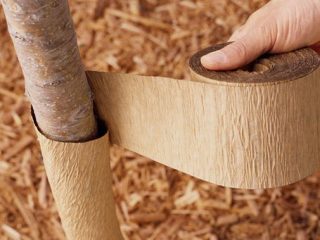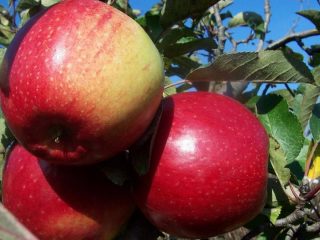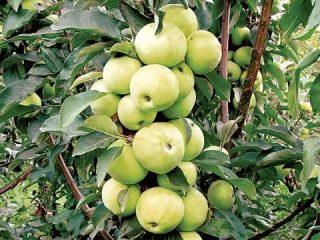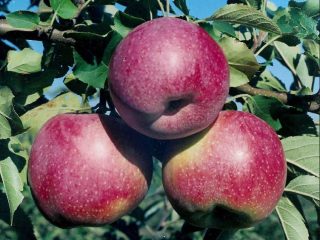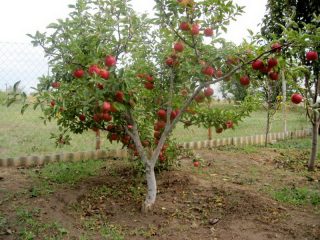Content
You rarely see unusual fruit trees in the gardens of our country. One of these is the Chinese Kerr apple tree variety. The plant has miniature fruits. It meets the highest requirements for frost resistance and tolerates drought well. It has high yields; you can harvest up to 120 cm per season.
History of selection
The Kitajka Kerr apple tree appeared in 1952. The creator of the variety is William Leslie Kerr (Canada). The breeder successfully crossed two varieties: “Dolgo” and “Harrison apple”. According to some sources, the second plant was "Haralson Red".
“Chinese Kerr” is not included in the Russian Breeding Register.
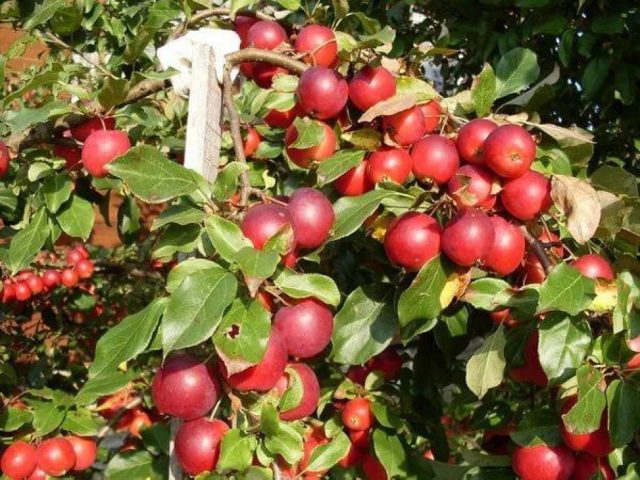
Apple tree "Chinese Kerr" requires the installation of a peg
Description of the Chinese Kerr apple tree variety with photo
The apple tree of this variety is a very beautiful plant, especially during the flowering period. The buds have a strong aroma that attracts bees for pollination, as a result of which the fruits have excellent quality characteristics.The period of appearance of buds falls in April-May.
This process is reminiscent of cherry blossoms. These are large inflorescences, with five leaves, containing up to 4-6 flowers.
Appearance of fruit and tree
This is a small plant with a neat crown, slightly spreading, and does not require regular pruning. Only damaged branches need to be removed. The shoots are greenish-brown in color.
There are 3 subspecies of “Chinese Kerr”:
- Tall, stretching up to 8 m.
- Medium-sized or semi-dwarf - up to 5 meters.
- Dwarf, not growing more than 2.5 meters in height.
The leaves of the Chinese Kerr apple tree are easily confused with plum trees. They have the shape of an ellipse, with pointed tips, and are small in size. Their surface is smooth, the edges are serrated.
The tree bears red fruits. There are always a lot of apples on the branches.
The shape of the fruit is slightly elongated; during ripening, their color changes from green to burgundy. There is a waxy coating on the skin. The aroma of the pulp is reminiscent of the smell of Antonovka apples.
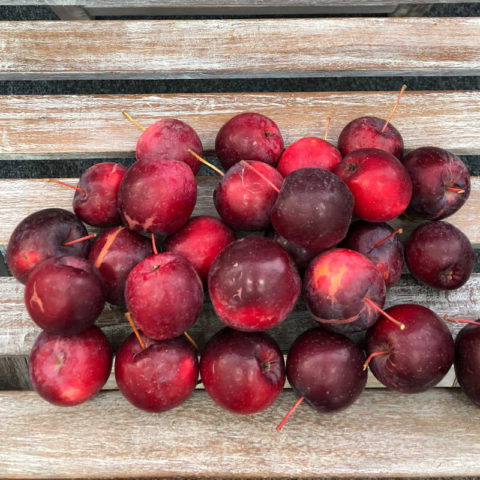
Apples of the "Chinese Kerr" variety can be stored in the cellar until mid-winter
Lifespan
Tall apple trees can grow and bear fruit for up to 60 years. Semi-dwarfs have a shorter lifespan - up to 40 years, and dwarfs have an even shorter lifespan - up to 25 years.
Taste
The apple flesh is dense and slightly pink. "Chinese Kerr" is considered the leader among all varieties of dwarf fruit trees. The fruits reach 7 cm in diameter and weigh from 20 to 50 g.
The taste of apples is rich, juicy, with slight sourness and tartness.
In terms of tasting qualities, apples are rated 4.4 points on a 5-point scale.
The sugar content of the pulp is 12-16%.Apples contain a lot of vitamin C, which allows them to be called medicinal.
Apples are suitable for fresh consumption, making preserves, jams and baking in the oven.
Growing regions
The China Kerr apple tree has a shallow root system, but highly branched. This allows the tree to be grown even in the harsh conditions of Siberia and the Far East.
The plant is not afraid of drought, so it can be planted in any region of Russia.
The apple tree does not like transplants; in extreme cases, it can survive it at the age of 3. Therefore, it is best to plant a seedling on the site immediately in a permanent place.
In warm climate zones, seedlings can be planted from the end of September until the 3rd decade of October, that is, before the first frost. In colder regions, it is better to plant the plant in the spring, at the end of April, so that it has time to take root and take root.
The ripening period of the Chinese Kerr apple tree
The fruits ripen late and can be harvested in mid or late September. The main advantage is that the fruits do not immediately fall off after ripening, but remain on the branches.
The first collection is carried out 3-4 years after planting. Productivity alternates every year between abundant and moderate.
If you store apples in a cool place, they can last until mid-January.
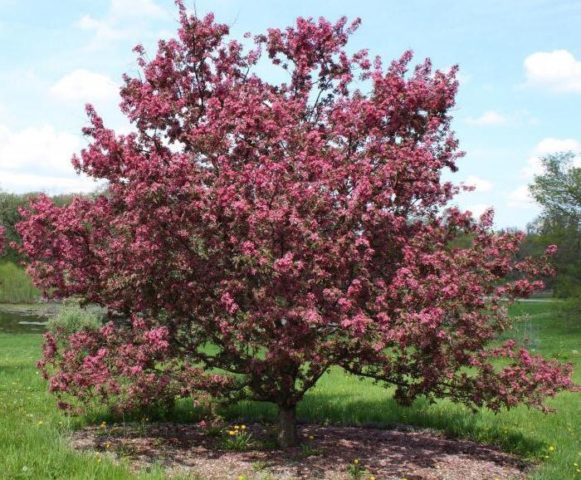
During the flowering period, the apple tree looks like sakura
Frost resistance
The apple tree can easily tolerate temperatures dropping to -30 OS. For this reason, “Chinese Kerr” can be found even in the Urals and in the Western Siberian region.
Resistance to diseases and pests
The Chinese Kerr apple tree is very resistant to diseases and pests. It resists oidium, scab and mildew well. However, the entire plant should be periodically inspected for damage by aphids, fungus and caterpillars.It is recommended to whitewash the root part in autumn and winter to prevent the proliferation of pest larvae.
For preventive purposes against the development of cytosporosis, it is recommended to treat the plant in the spring with the preparation “Hom” or a solution of copper sulfate. For aphids, use tobacco or soap.
Flowering period and ripening period
Flowering of "Chinese Kerr" occurs at the end of April - beginning of May. If the tree grows in a warm climate, harvesting may already begin in mid- or late August. In areas with a temperate climate, the fruits are harvested in September.
Pollinators
"Chinese Kerr" is often used as a rootstock for other varieties of apple trees. Abundant flowering of the tree increases the productivity of nearby plants.
Transportation and keeping quality
If you follow the storage rules, apples will last until mid-January. At the same time, they will not lose their attractive appearance and their taste will not change.
Transporting the fruits is easy; there are no special requirements.
Advantages and disadvantages
The main positive aspects of “Chinese Kerr” include:
- High degree of frost resistance.
- Tolerates drought well.
- Excellent resistance to diseases and pests.
- Unpretentious to soil quality.
- The fruits are juicy and tasty, suitable for preparing preparations and desserts.
Wood has good aesthetic qualities, so it is often used in landscape design. A well-chosen place for planting will not only decorate the area, but also produce a good harvest of apples every year.
There are no negative aspects of the apple tree.
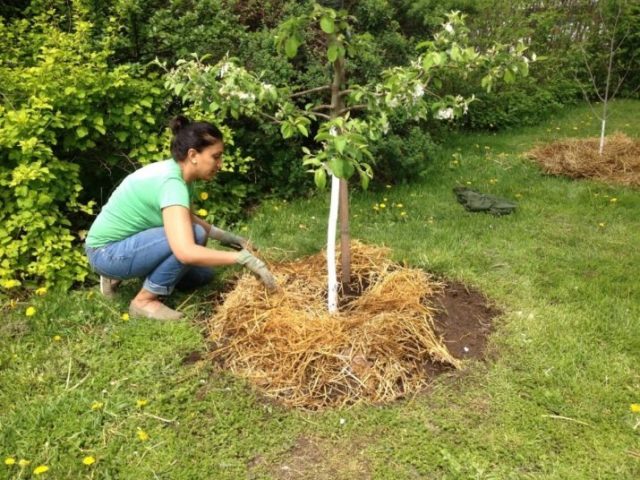
After watering, it is recommended to mulch the root system of the apple tree.
Landing rules
The China Kerr apple tree prefers non-acidic and fertile soils.The tree is suitable for a sunny area, but can also survive in a shaded area.
It is better not to plant the plant in soil where there is high groundwater or heavy soil. The apple tree will survive, but will not have its inherent decorative features.
It is best to prepare a hole for planting a tree a month in advance. To do this, after digging, add fertilizer inside:
- 3 buckets of humus;
- 10 tbsp. l. wood ash;
- 1 cup superphosphate;
- 4 tbsp. l. potassium sulfate.
All components are thoroughly mixed with each other and with the lower fertile layer of soil. Within a month, fertilizers can partially decompose and improve the quality of the soil. After planting, the seedlings are watered abundantly.
Before planting, it is recommended to soak the roots of the apple tree in warm water, and dip it in a clay mash just before placing it in the ground.
Growing and care
For the first 2 years after planting, the plant must be tied to a peg. If we are talking about a dwarf species, then it is left for the entire life cycle of the plant. During the same period, in the spring, all flowers must be picked off. In the future, it is also recommended to thin out the buds to regulate fruiting and reduce the load.
Young plants are fed 2 times throughout the year: in May and September. Fruit-bearing trees are fertilized 4 times.
Weeds should always be removed near trees, especially if they are a dwarf species.
The Chinese Kerr apple tree is unpretentious in care, however, it requires infrequent, but abundant watering. One tree requires 3-4 buckets of water, preferably warm. It is best to cover the root system with mulch after watering.
Collection and storage
The fruit harvest occurs around mid-September. Apples grow in clusters of 4-8 pieces. This greatly simplifies the collection process.
After harvesting, you can place it in a cellar or basement. To prevent the process of rotting from starting, the fruits are placed in wooden or cardboard boxes. Each layer of apples must be covered with paper.
If you have time and desire, then each apple can be wrapped in newspaper.
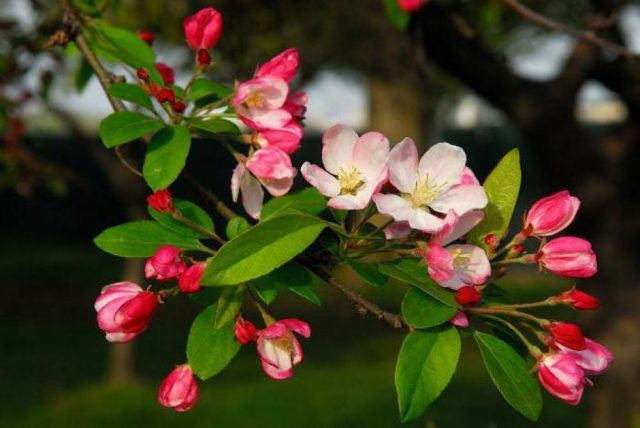
"Chinese Kerr" not only gives an excellent harvest, but also has a decorative function
Conclusion
The Chinese Kerr apple tree variety is a spectacular representative of dwarf fruit tree species that can decorate any area. The fruit has an unforgettable taste, with light notes of sourness and tartness. There are no problems with care, the plant is not prone to diseases and resists pests and severe frosts well.
